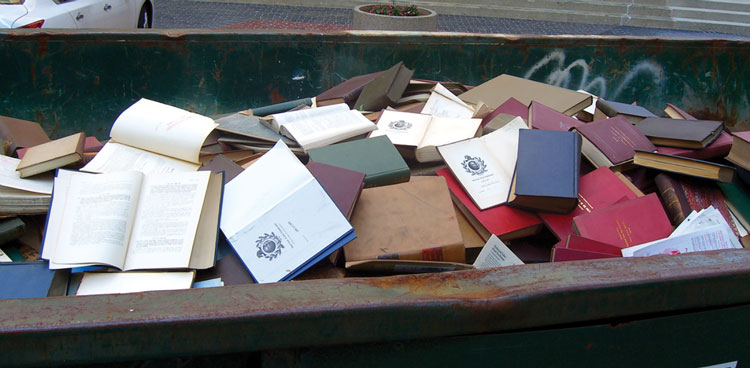The tragedy of ‘deaccessioning’ books from university libraries

Photography by Terri Glanger, walknboston
Scenario No. 1: An ambitious pre-law student working on a senior thesis about Shakespeare’s Love’s Labour’s Lost goes to the library and discovers, much to his surprise, two long aisles of books about Shakespeare—some 6,500 books on just that subject. He spends hour after hour combing through the many tomes, checking the indexes and then reading the relevant passages. Many scholars, he finds, have written about Shakespeare’s “curious foppery of language” (Walter Pater [1889]) in the play, which is “truly a comedy on the state of the English language in 1588” (William Mathews [1964]). One scholar (Friedrich Landmann), in an obscure monograph from the early 1880s, defined the four types of linguistic abuse found in the play: excessive alliteration, Petrarchan love-sonneting, euphuism (fancy syntax and word choice) and perversely extreme Latinity. Nearly a century later, an American critic called the play “a sustained inquiry into the nature and status of words; and the characters in it embody, define and implicitly criticize certain concepts of words” (Ralph Berry [1969]).
Our prelaw student is off to a fruitful start for his senior thesis. His professor has suggested that a true scholar must research enough to know what predecessors have done. Gleaning these quotations, and many others as well, has taken our budding scholar some 100 hours of effort. Along the way, he has learned much about Shakespearean criticism, the means of traditional book research, the methods of literary analysis, and the sheer vastness of scholarly work in the field.
Meanwhile, his faculty adviser insists that the thesis center on the student’s own close reading of the play—not on that of earlier scholars. Along the way, he can mention what others have said either to dispute their conclusions or endorse them. The quotations must be incidental to his own analysis; they can’t substitute for it. But he shouldn’t try to write in ignorance of his precursors.
Scenario No. 2: A legal scholar working on an essay about the doctrine of precedent means to steep herself in the literature on the subject. She goes to the jurisprudence section of her copiously stocked law library and spends days collecting snippets from Francis Lieber (in a posthumous edition of a book dated 1883), Timothy Walker (1895), Clarence Morris (1938), John Salmond (1947), W.J.V. Windeyer (1949), Burke Shartel (1951), W.W. Buckland (1952), A.W.B. Simpson (1961), Max Radin (1963) and Rupert Cross (1991). She’s surprised because none of the law review articles she’s read in the last several years cite any of these authorities. She traces back some aspects of the doctrine to William Blackstone (1765), James Kent (1826) and Joseph Story (1858).
That recitation of authorities just skims the surface of what she’s uncovering. She’s surveying the field so she can trace the development of precedent in common-law systems before embarking on her bold new theory. This time-consuming research will tell her how novel her theory is. She’ll need a thorough grounding.
Many of her discoveries are serendipitous. Working from her library carrel, she browses stacks of books to find relevant essays in unlikely places. She hadn’t expected to find pertinent information in a 1935 book by Henri Lévy-Ullmann or in a 1914 book by Frederic R. Coudert. Those writers’ penetrating insights help refine her thesis. She’s delighted with the copiousness of her university library’s holdings.
Bryan A. Garner, the president of Dallas-based LawProse Inc., was originally a Shakespearean scholar, then a legal lexicographer, then a writer on jurisprudence—as well as a book collector. He has an appellate-consulting practice. His most recent book is the memoir Nino and Me: My Unusual Friendship with Justice Antonin Scalia.
This article was published in the May 2018 issue of the ABA Journal with the title "Booking the Dumpster: The tragedy of 'deaccessioning' books from university libraries".



